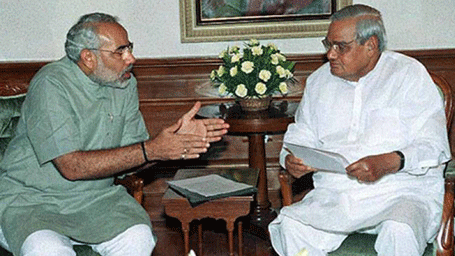RAPPED: Narendra Modi, the then chief minister of Gujarat, was reprimanded by the then Prime Minister Atal Bihari Vajpayee during the executive committee meeting of the party held in Goa immediately after the post-Godhra riots. Vajpayee demanded the resignation of Modi, insisting that he did not observe raj dharma which requires that all communities should be treated equally.
By Outlook Web Desk
The Supreme Court took 20 years to uphold the manipulated report of the special investigation committee getting Modi a clean chit in the post-Godhra rioting. Senior police officer Sanjiv Bhatt is on record that the then chief minister of Gujarat, Narendra Modi, told senior officials not to take any action against the Hindutva mobs who targeted the Muslim community.
From the Supreme Court giving a clean chit to PM Modi to dismissing a plea of ‘larger conspiracy’, here’s looking back at the chronology of the 2002 Gujarat riot case.
The Supreme Court of Friday upheld the Special Investigation Team’s (SIT) clean chit to 64 people including PM Narendra Modi, in the 2002 Gujarat riot case and dismissed a plea by slain Congress leader Ehsan Jafri’s wife Zakia Jafri. Back then, Modi was the chief minister of Gujarat. The apex court, while dismissing the petition filed by Zakia Jafri in the Gujarat Riot case, observed that the plea was devoid of merit.
The 2002 Gujarat riot case saw extreme events of inter-communal violence, where trains were burnt and many lives were lost. It started on February 27, 2002, when over 50 pilgrims travelling back from Sabarmati Express were attacked and train coaches were burnt. Following this, there was a further outbreak of violence in other parts of the state, where hundreds of Muslims were killed. According to government data, 790 Muslims and 254 Hindus were killed, 223 more people reported missing and another 2,500 injured.
Here’s a look back at the chronology of the violence and what unfurled during the riots:
February 27, 2002: 59 Kar-sevaks travelling in Sabarmati Express train, returning from Ayodhya, were allegedly attacked and coaches of the train were set on fire at Godhra Railway Station.
February 28, 2002: Mob attacked inhabitants of Gulberg Society, Meghaninagar, killing 69 persons including the husband of appellant — Zakia Ahsan Jafri — who had unsuccessfully attempted to dissuade the mob.
March 6, 2002: Gujarat government appoints a Commission under the Commission of Inquiry Act to probe the Godhra incident and the post-Godhra riots.
October 9, 2003: National Human Rights Commission files a writ petition before Supreme Court seeking a fair investigation. SC appoints senior advocate Harish Salve as Amicus Curiae.
June 8, 2006: Zakia Jafri files a complaint against Modi and others about the larger conspiracy behind the 2002 riots.
March 26, 2008: SC appoints a Special Investigation Team headed by former CBI director RK Raghavan.
May 1, 2009: Top court vacates stay of the trials and directs the prosecution of cases in Special Courts, and SIT appointed by it to submit a progress report.
May 6, 2010: SC directs that the trial court shall not pronounce the final judgment till further orders by it. Gulberg Society case was put on hold after the resignation of the Special Public Prosecutor appearing in that case.
Sept 11, 2011: SC directs Chairman, SIT to forward a final report, along with the entire material collected, to the court which had taken cognisance of the crime.
February 8, 2012: SIT files closure report giving a clean chit to Modi and 63 others, including senior government officials, saying there was “no prosecutable evidence” against them.
April 15, 2013: Zakia Jafri files a protest petition in a local court seeking rejection of the SIT report giving a clean chit to Modi and others in the Gulberg Society riot case.
December 26, 2013: The protest petition was rejected by the Metropolitan Magistrate and the final report of the SIT is accepted.
October 5, 2017: This decision was carried before the High Court which rejects Zakia’s plea against the SIT decision.
September 12, 2018: Zakia moves the SC challenging the Gujarat High Court’s order rejecting her plea against the decision of the SIT.
October 26, 2021: SC begins hearing Zakia’s plea on regular basis.
December 9, 2021: SC reserves judgement on the plea filed by Zakia.
Jun 24, 2022: SC dismisses Zakia’s plea and upholds SIT’s clean chit to Modi and others.
(with PTI inputs)
Courtesy: Outlook India
